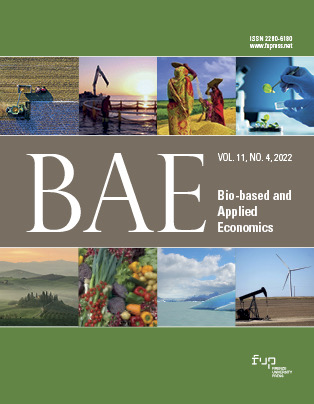Provision of public goods and bads by agriculture and forestry. An analysis of stakeholders’ perception of factors, issues and mechanisms
Published 2023-05-03
Keywords
- Ecosystem services,
- Common Agricultural Policy,
- public goods,
- stakeholders,
- transdisciplinary approach
How to Cite
Copyright (c) 2022 Stefano Targetti, Valentina Marconi, Meri Raggi, Annette Piorr, Anastacio José Villanueva, Kati Häfner, Mikko Kurttila, Natalia Letki, Mihai Costica, Dimitre Nikolov, Davide Viaggi

This work is licensed under a Creative Commons Attribution 4.0 International License.
Funding data
-
Horizon 2020 Framework Programme
Grant numbers 633838
Abstract
The provision of public goods by agriculture and forestry has been a major topic of the agricultural policy debate in the EU. The objective of this paper is to investigate local stakeholder perceptions regarding the cause-effect relations between agriculture and forestry activities and a broad set of public goods and bads, and hence to contribute to the identification of improved policy options for a more efficient delivery of public goods from rural areas. The study presents an assessment based on 71 stakeholder questionnaires collected from seven case study regions in different EU countries. The survey was based on a list of the most relevant public goods and bads developed with the local stakeholders, and aimed to collect stakeholder perception of positive and negative impacts of agriculture and forestry on a range of environmental assets and their relationship with local drivers, socio-economic and cultural features, and policy mechanisms. The analysis shows that the role of agriculture and forestry in the provision of public goods is perceived as generally positive across the selected case study regions. Stakeholder opinions concerning the negative impacts on the environment were more divergent. In particular, differences regarding the impact of different socio-economic and cultural features, and policy mechanisms are evidenced. The results outline the importance of regulations. Also, payments for environmental services are considered relevant in particular for biodiversity, landscape, and water quality. Beside that, aspects such as expectations of society and the attitude of farmers towards the environment resulted noteworthy.






